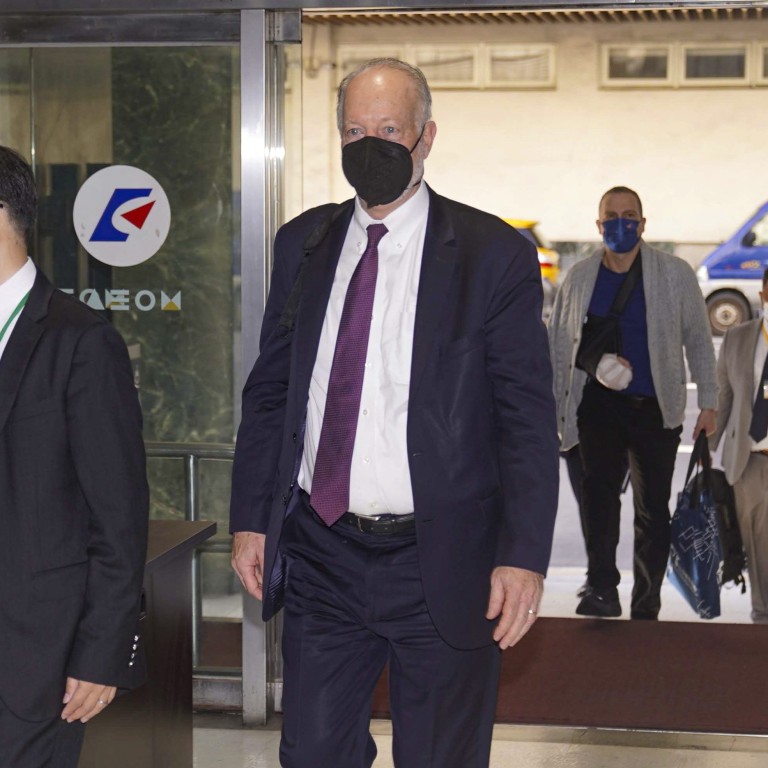
US, Taiwan ‘exchange views’ during ‘satisfactory’ talks toward landmark trade deal
- Second round of in-person talks came after Washington and Taipei agreed in June to pursue the US-Taiwan Initiative on 21st-Century Trade
- Taiwan points to ‘possibility of signing early-harvest deals’ on various traded goods
Taiwan and the United States wrapped up four days of talks on Tuesday with the goal of signing a trade initiative that would increase economic contact, but analysts warned that any deal could provoke Beijing.
US and Taiwanese officials “exchanged views” over the past few days on the proposed text for the agreement, the US trade representative’s office said in a statement.
That text covers trade “facilitation”, anticorruption, small and medium-sized enterprises and regulatory practices, according to the statement.
“Officials also reached consensus in a number of areas and pledged to maintain an ambitious negotiating schedule in the months ahead to continue this momentum,” the US side said. “These texts follow through on the two sides’ shared commitment to pursue a high-ambition trade initiative.”
Taiwan aims to lure more foreign talent with visa changes to stay competitive
US officials have said that the two sides will also discuss labour standards, a deepening of agriculture trade and the removal of “discriminatory barriers”.
“These trade negotiations are being conducted in accordance with the United States’ one-China policy, which is guided by the Taiwan Relations Act, the three US-China Joint Communiques, and the Six Assurances,” the US statement said.
For Taiwan, what they get is rather symbolic – like, ‘Look, I can talk with the US and sign some documents’
A deal of any kind would deepen Taiwan-US contact, which could anger Beijing, said Huang Kwei-bo, an associate professor of diplomacy at the National Chengchi University in Taipei.
“I think, for Taiwan, what they get is rather symbolic – like, ‘Look, I can talk with the US and sign some documents,’” Huang said.
The Office of Trade Negotiation under Taiwan’s Executive Yuan said in a separate statement on Tuesday that both sides “are satisfied with” the talks.
“Overall, there will be more convenient arrangements in customs declarations and document verifications for Taiwan-US trade,” the Taiwan side said. “More transparent measures will be taken in the future. We will build up multiple bilateral platforms to promote bilateral cooperation and share the successful experiences and difficulties, so as to push for more efficient solutions in bilateral trade and investment”.
It also said both sides would continue to hold talks virtually.
“If progress is good, we do not rule out the possibility of signing early-harvest deals on some items,” it said.
China’s loss is Southeast Asia’s gain as supply chains shift
Beijing views the self-ruled island as part of China to be unified, by force if necessary. Countries that have diplomatic ties with Beijing, including the US, acknowledge the existence of the one-China principle stating that Taiwan is part of China, but they may not explicitly agree with it.
Analysts believe that officials in Washington are uninterested in signing a full-blown agreement that drops tariffs on imports from Taiwan, which has a US$30 billion trade surplus with the US.
Taiwanese leaders hope to protect their farmers from any US imports that would become cheaper on the island if tariffs fell, Woods Chen, the head of macroeconomics at Taipei-based Yuanta Securities, said last week.
Taiwan stands to gain from a trade deal as the bigger exporter, said Allen John Ku, director of Startup Island Taiwan, a Taiwanese-government-backed brand for new companies.
“Taiwan needs America, and hopefully that’s something that’s recognised by our friends in Washington,” Ku said, noting an advantage to the island’s chips versus agricultural imports from the US.
“Taiwan sends over very expensive little things, and the stuff we buy from [wholesale retail chain] Costco can’t equal what TSMC’s sending out.”
Beijing is wary of the closer contact between Taiwan and the US that might complicate cross-Strait tensions. The overall deal could be taken as a jab at Beijing too, some experts say.
Taiwan extends mandatory military service to prepare for cross-strait clash
“Anything that would strengthen the ties between Taiwan and the US would be seen by China as a threat,” said Alexander Vuving, a professor at the Daniel K. Inouye Asia-Pacific Centre for Security Studies in Hawaii.
“The threat is not commercial, it’s more perceptive,” Vuving said. “If you have a trade deal, Taiwan would become a trading partner of the United States. That would be a very negative development for China’s goal of isolating Taiwan.”
In Beijing, the government’s Taiwan Affairs Office spokesman, Ma Xiaoguang, urged the US last week not to play the “Taiwan card” and warned against actions that would thwart mainland-Taiwan unification.
A US-China trade dispute has been festering since 2018, while Taiwan is looking for more foreign allies because it sees the mainland as a growing military threat.
Additional reporting by Lawrence Chung

